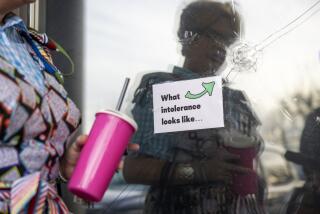Noriega money-laundering trial begins in France
Manuel Noriega, the aging former dictator of Panama, went on trial here Monday on charges of laundering money by stowing profits from drug trafficking in French bank accounts and purchasing luxurious Parisian apartments.
Noriega, 76, was extradited to France two months ago from U.S. custody, where he was held for 20 years after being deposed and convicted of helping Colombian cartels ship drugs to American soil.
He did not speak in his defense Monday, but called out his name and birth date in a surprisingly strong voice that contrasted with his hunched-over physical appearance.
He has maintained that the $2.8 million in allegedly laundered money came from a rich brother, his wife’s personal fortune and CIA paychecks handed out when he controlled Panama in the 1980s.
At that time he was allied with some U.S. agencies that sought his help combating the influence of communism in Latin America. The American government turned against him in part because of his ties to drug cartels, and he was overthrown with the help of a U.S. military invasion launched in 1989.
“This is a strange trial, with conspiracy,” said one of his daughters, Thays Noriega, who sat in court beside her two sisters. Noriega was in a large, cage-like cell inside a plain room at the Palace of Justice.
Noriega had been convicted in absentia in 1999 by a French court. Once the French request for extradition was granted in April, he benefited from the right to be retried in the same case. He faces as many as 10 years in prison if convicted.
Without focusing on whether Noriega was guilty, his lawyers on Monday maintained that France had no right to try him.
“The problem is whether France has the ability to judge a former head of state, whereas jurisprudence forbids it,” said defense attorney Olivier Metzner.
Metzner said he wanted Noriega to be sent to Panama, under Geneva Convention protection for war prisoners. The former leader is wanted in his homeland on charges of torturing and murdering political opponents and violating human rights.
Prosecutors said that because Noriega was no longer head of Panama, he was not entitled to immunity.
Lauter is a special correspondent.
More to Read
Start your day right
Sign up for Essential California for news, features and recommendations from the L.A. Times and beyond in your inbox six days a week.
You may occasionally receive promotional content from the Los Angeles Times.






